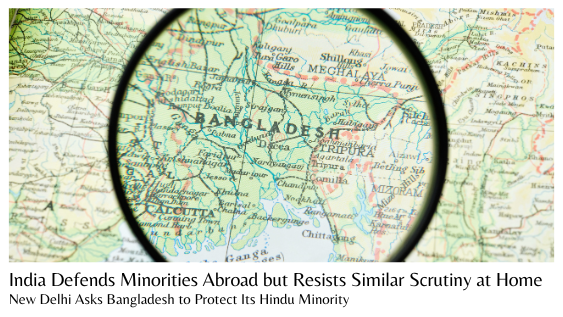
India Defends Minorities Abroad but Resists Similar Scrutiny at Home
Amid a wave of violent attacks on minority communities in Bangladesh, the Indian government has firmly urged the interim government there to protect its Hindu minority. Although this is a commendable stance, it reveals a clear contradiction in New Delhi’s foreign policy. While India has consistently rejected external critiques of its minority protections, it is now using similar diplomatic language to voice concerns in a neighbouring country.

Post-Mortem: 3 Kuki-Zo Youths Tortured in Assam Police Custody Before Death
The post-mortem examination of three young men from the Hmar community has revealed signs of brutal torture before they died from gunshot wounds in custody of the Assam Police. The finding contradicts the police’s claim that the deaths resulted from a fatal crossfire.
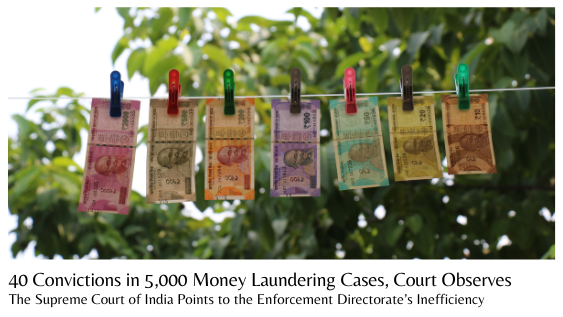
40 Convictions in 5,000 Money Laundering Cases, Court Observes
The Supreme Court of India has made critical observations regarding the Enforcement Directorate (ED) while hearing a matter related to the Prevention of Money Laundering Act (PMLA). The court noted the inefficiency of the agency, pointing out the disproportionally low conviction rate, with only 40 convictions in 5,000 registered cases. Could this inefficiency stem from the ED’s alleged politicisation and weaponisation by the ruling party, creating a bureaucracy where loyalty overshadows skill and professionalism?
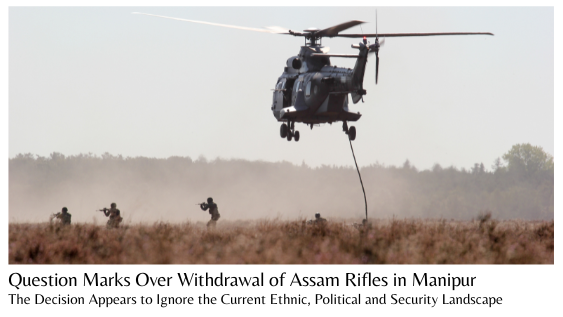
Question Marks Over Withdrawal of Assam Rifles in Manipur
The central government has reportedly directed two battalions of the Assam Rifles in the northeastern state of Manipur to relocate to the Jammu and Kashmir region for operations against militants. While it’s entirely within the rights of the Union Ministry of Home Affairs to make such decisions, the ethnic, political and security landscape in Manipur, coupled with the timing of this move, raises three significant questions.
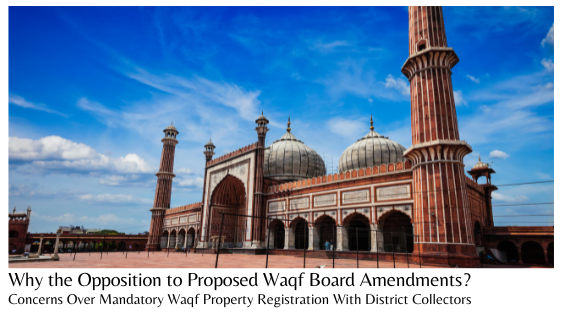
Why the Opposition to Proposed Waqf Board Amendments?
The central government is reportedly set to introduce a bill aimed at changing how the Waqf Board operates. This body, established by the government, oversees properties donated by Muslims for religious, educational, and charitable uses. According to reports, the bill would require Waqf properties to register with district collectors to verify their true value. Many are concerned that this could reduce the board's autonomy and increase government control.
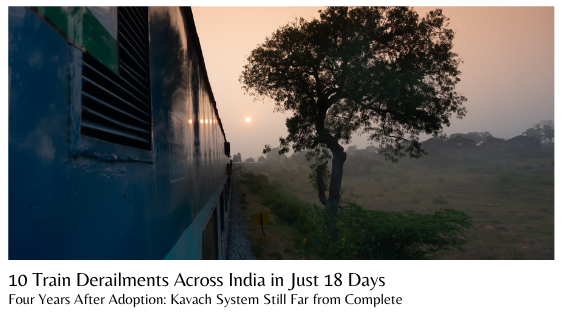
10 Train Derailments Across India in Just 18 Days
In the span of just 18 days, India’s sprawling rail network has witnessed a distressing series of derailments, with 10 trains veering off the tracks across various regions. These incidents call for urgent conversations about the safety and reliability of a transport system integral to the nation’s daily commute.

Declare Kerala Landslides a National Disaster: Opposition Parties
Following the devastating landslides in Chooralmala and Mundakkai areas of Kerala, which have claimed over 358 lives with more than 250 people still missing, as of August 4, opposition parties are pressing the central government to recognise the catastrophe as a national disaster. The state government has already designated the area as a disaster zone, but calls for national recognition continue as they seek access to additional relief funds.
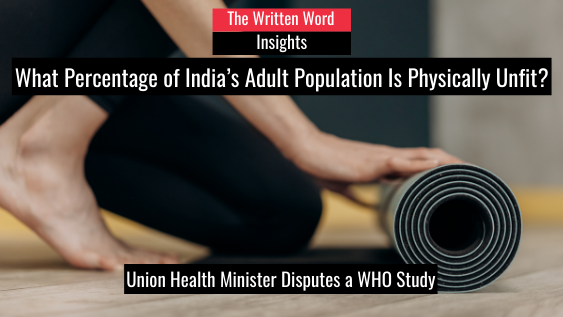
What Percentage of India’s Adult Population Is Physically Unfit?
Union Health Minister J.P. Nadda challenged the credibility of a WHO report during a session in the Lok Sabha. The report had labelled half of India’s adult population as physically unfit. He criticised the report’s methodology, saying it only sampled populations from Tamil Nadu, Maharashtra, Jharkhand and the Union Territory of Chandigarh, then extrapolated these findings nationwide. Nevertheless, according to another study he referenced, India’s rates still fall significantly below the global average.
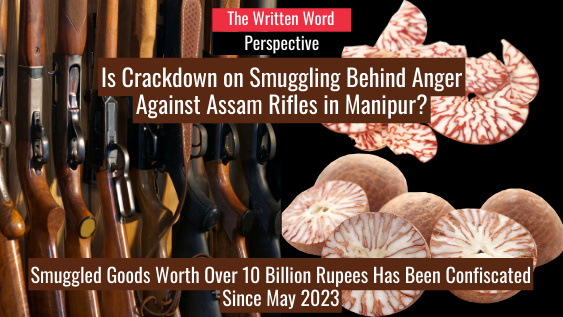
Is Crackdown on Smuggling Behind Anger Against Assam Rifles in Manipur?
In the violence-afflicted state of Manipur in India’s northeast, the Assam Rifles, a key central force, finds itself under intense scrutiny. It’s at the centre of a vocal campaign that accuses it of taking sides in the ethnic conflict between the majority Meitei community and the Kuki-Zo tribal groups. However, this claim might just be a smokescreen to divert attention from what could be the real issue: the Assam Rifle’s clampdown on rampant smuggling activities in the region, according to reliable sources in the security establishment Newsreel Asia has spoken with.

Madhya Pradesh Prioritises Cow Welfare Over Dalit, Tribal Uplift
Madhya Pradesh is reportedly allocating money intended for the welfare of scheduled castes (SC) and scheduled tribes (ST) to develop religious sites, museums and cow welfare initiatives. This shift in priorities comes as crimes against these marginalised communities have seen a steep increase.

Delhi Journalist Detained While Reporting
Poonam Pandey, a Delhi-based journalist, was prevented by police from filming a protest and subsequently detained while covering the demonstration by the opposition Congress party. The Press Club of India has requested a judicial inquiry into the incident, voicing concerns about the treatment of journalists in the country.

How the New Broadcast Bill Affects You
The proposed Broadcast Bill, if passed, will dramatically extend regulatory oversight to include social media influencers and online content creators, potentially impacting not just local digital personalities but also global creators targeting Indian audiences. The bill proposes rigorous registration requirements, stringent content scrutiny and increased governmental intervention, raising significant concerns about freedom of expression, privacy and the dynamic nature of online interactions.

Is Central Govt Shifting Development Responsibility to States and Private Sector?
The central government’s infrastructure spending, or capex, will remain at 3.4 percent of GDP, Economic Affairs Secretary Ajay Seth said in an interview with ThePrint. This decision, outlined during the announcement of the Union Budget 2024, signals a significant shift in strategy. Seth said it’s now up to state governments and the private sector to step up their investments in infrastructure. Is this move good for the country’s growth and beneficial for its people?

Over 50 Million Cases Pending in Indian Courts
Only 757 out of a sanctioned strength of 1,114 judges are in place across various High Courts, which is just about 68%, according to the Union Ministry of Law and Justice, which also disclosed that over 50 million cases are pending across various courts in India and the Supreme Court has 50 pending Constitution Bench matters, including a longstanding case from 1994.

Over 100,000 Indians Die Each Year Due to Vanishing Vultures
The decline of vulture populations in India, caused by the common use of the painkiller diclofenac in livestock, has resulted in an average death rate increase of 4.7% and economic losses estimated at $69.4 billion each year, according to a report published by the American Economic Association journal.

Is 2024 Budget Good for Average Taxpayers and the Poor?
India’s 2024 budget introduces significant fiscal changes, which are likely to reshape the economic landscape for various sectors of society, particularly impacting poorer segments and average taxpayers. The nuances of these expected changes reveal a contrast between immediate relief measures and the broader, potentially more burdensome, tax implications that accompany them.

Political Favouritism in Budget Allocations is Harmful
The 2024 budget, presented by Finance Minister Nirmala Sitharaman on July 23, allocated significant funds specifically to Andhra Pradesh and Bihar. These financial commitments to the two states appear to be part of the Bharatiya Janata Party (BJP)’s strategy to support the ruling parties of these states, which are crucial in maintaining the central government's majority in Parliament. This apparent quid pro quo arrangement undermines the principle of equitable development across all states, regardless of their political affiliations.

Supreme Court Suspends Naming Order for Eateries in Uttar Pradesh, Uttarakhand
The Supreme Court of India has issued an interim order, halting the enforcement of directives in Uttar Pradesh and Uttarakhand that mandated eateries along the Kanwar yatra route to display the names of their owners. The court decided that these establishments need only to show the type of food they serve, stressing the irrelevance of the owner’s name or religion in serving the Kanwariya pilgrims.

One-Fourth of India’s Population Will Be Over 60 by 2050
By 2050, the elderly population in India is projected to double, reaching 346 million, according to Andrea Wojnar, the India chief of United Nations Population Fund (UNFPA), who stressed the urgent need for expanded investments in healthcare, housing and pensions to accommodate this demographic shift, particularly focusing on older women who face a higher risk of living alone and enduring poverty.

Editors Write to Rahul Gandhi, Express Concerns Over Media Laws
The Editors Guild of India (EGI) has written to Rahul Gandhi, the Leader of the Opposition in Lok Sabha, urging him to raise the issue of press freedom and right to information in the Parliament. In a letter, the EGI expressed deep concerns over several recent legislative measures which threaten the fundamental freedoms that underpin journalistic practice in the country.
